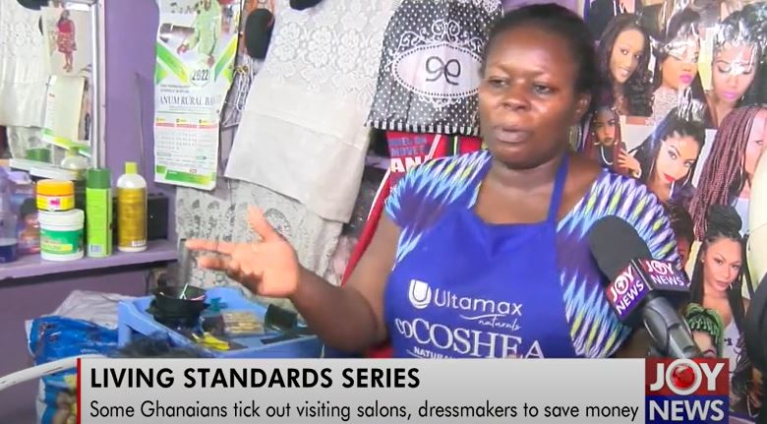Some Ghanaians have begun tightening their budgets to make ends meet due to the incessant increase in the cost of goods and services in the country.
Although the government has not announced an increase in utility tariffs, many suspect the tariffs have been adjusted, a development that is causing people to realign their priorities.
In the current episode of the JoyNews’ Living Standard Series, some residents of Kaneshie, a suburb of Accra, said they have identified a number of items, including visits to the salon and dress makers, which they have removed from their budget.
Shops in the Kaneshie market do not have their own electricity meters; administrators share electricity bills per the number of gadgets in the shop, a situation some traders have complained about.
Jennifer works inside the market as a hair stylist. She targets traders who may be too busy to visit hairdressing salons in their residential communities.
Despite the affordability of her services due to her target market, her customers have not been frequent lately.
The situation is affecting her ability to make her offset her bills, talk less of making profit.
Previously, she had four hair driers and paid over GH¢300 for electricity, but because few customers show up in her shop, paying electricity bills has become a challenge.
To solve the problem of over-billing, she has sent two hair driers home.
For two weeks, not even a single customer visited her shop. Luckily, two customers visited her shop this week. One went to braid and the other to wash her hair.
Her customer, Daavi who had not visited her for weeks, said economic difficulties are to blame. She had to relocate to beat down rent charges.
“This is where I braid my hair but for some time, financial difficulty is making it difficult. Paying of bills in my house always turns into arguments. The bills are high and I would prefer to have my own bill,” she said.
Emmanuella, who is a church administrator, joined the conversation.
She simply cannot explain how her water bills keep rising even though the Public Utilities and Regulatory Commission has not announced an adjustment of tariffs.
“For me, it’s been going high because I usually pay, so I know how much I’ve been paying over the period. Recently, the bill that came was almost GHC130 for water; so, I am wondering why the water is still going high.”
Seamstresses are also reporting low patronage because food prices are high, fuel prices are high and transport fares have equally skyrocketed.
People are left with no option than to kick out many things from their priority lists to survive.
Latest Stories
-
Ghana’s Henry Bukari hands over chairmanship of ECOWAS Brown Card Council of Bureaux
4 mins -
Residents of Dome-Kwabenya on edge ahead of December elections
35 mins -
Moffy drops new single ‘Wo’, blending culture and modernity
47 mins -
Don’t bring soldiers to polling stations – Martin Kpebu
60 mins -
Ogyeahohuo Yaw Gyebi II retained as President of National House of Chiefs
1 hour -
Embrace ICT to fit in digital world – Ho NYA boss to youth
2 hours -
We don’t want armed soldiers at polling stations – Tanko-Computer
2 hours -
Drama as police corner armed robbers inside locked forex bureau at Lapaz
2 hours -
NEIP CEO to Kwaku Manu: You can support any political party, but stop misbehaving in NPP colours
2 hours -
30% quota for less privileged shows Free SHS is inclusive – Ofosu Nkansah
2 hours -
Nigerian-born conquers childhood hearing loss to become KNUST’s overall best graduating student
3 hours -
ECOWAS Court orders compensation for violations against New Force’s Shalimar Abbiusi
3 hours -
Dreams FC denies allegations of attempting to sign Najeeb Yakubu
4 hours -
Election 2024: ‘Right to free and fair elections non-negotiable’ – Akufo-Addo
4 hours -
Kurt Okraku took out my passport from the U23 squad that travelled to Japan – Najeeb Yakubu alleges
4 hours

